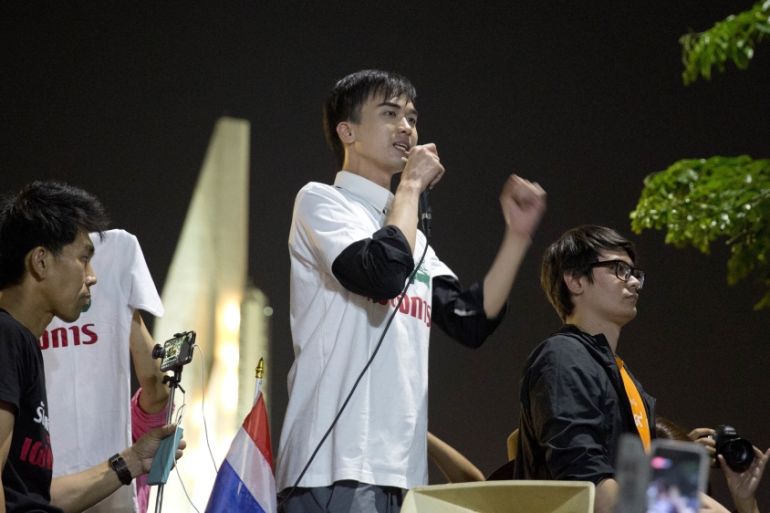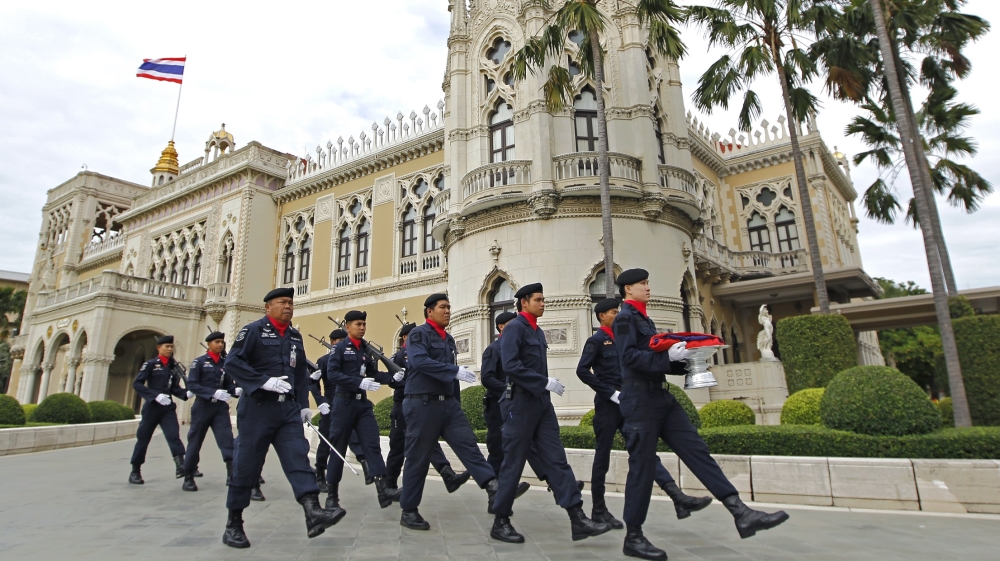Thai pro-democracy activist faces prison over Facebook post
Karn Pongpraphapan denies police allegations that he threatened monarchy and hints his days as an activist may be over.

Bangkok, Thailand – Pro-democracy activist Karn Pongpraphapan is facing possible imprisonment after being accused of violating Thailand’s controversial Computer Crime Act over a Facebook post he shared that police said threatened the country’s monarchy.
The 25-year-old’s post never explicitly mentioned Thailand and simply referenced the historic downfalls of European monarchies. But it was enough for authorities to arrest him under Thailand’s cyber-laws.
Keep reading
list of 4 itemsPalestinian Prisoner’s Day: How many are still in Israeli detention?
‘Mama we’re dying’: Only able to hear her kids in Gaza in their final days
Europe pledges to boost aid to Sudan on unwelcome war anniversary
Karn was arrested at his home last week and was released after posting bail of 100,000 Thai baht (US$3,300).
In an interview with Al Jazeera following his release, Karn said he was “totally surprised” when police came to his house.
|
|
“I thought, ‘What’s happening? Why are they here?’ I didn’t know what to do.”
It was only when they were at the police station that Karn realised the trouble was over his Facebook post.
The Computer Crime Act was passed in 2007 to punish those responsible for committing computer-related crimes such as hacking, illegally accessing a user’s data, or using electronic means to monitor or eavesdrop on others.
In 2016, the military government made amendments to the law despite a petition signed by more than 300,000 people demanding that the assembly reject it.
Article 19, a human rights organisation that defends freedom of expression and information, found in a 2017 analysis that the amendments were “rife with broad powers that are susceptible to abuse and could severely punish legitimate political, academic, or social expression”.
‘Problematic law’
Matthew Bugher, head of Asia Programme for Article 19, explained to Al Jazeera how “problematic” the law is as it is often used alongside legislation on criminal defamation or lese majeste.
“The [law] has often been used to silence activists and dissidents, as well as ordinary citizens expressing critical opinions,” Bugher said.
“The use of the Computer Crimes Act to target an individual for such banal references to monarchies in other countries is extremely worrying, but not surprising. Thailand’s legal framework provides authorities with plenty of tools to silence dissenters and suppress free speech.”

Karn rose to prominence in 2018 as a member of the largely youth-led pro-democracy organisation, Democracy Restoration Group. The group took part in a demonstration outside army headquarters in Bangkok, calling for elections after four years of military government.
His arrest this month comes amid a rising climate of criticism of the government and monarchy, mostly through social media.
A week before Karn’s arrest, a hashtag criticising a royal motorcade that had held up major roads in the capital became one of the top trending topics on Thai Twitter, shared thousands of times in a single day.
|
|
Criticism of the monarchy in Thailand, however, carries a stiff punishment, with up to 15 years in prison under the country’s lese majeste law prohibiting insult to the royal family.
Thailand’s academics have also expressed concern about the cyber-law.
Dr Puangthong Pawakapan, associate professor of political science at Bangkok’s Chulalongkorn University, noted that for many years, the law was used alongside the lese majeste law.
“But now the Thai authorities tend to drop the lese majeste charge and use the Computer Crime Act only in order not to draw attention to the monarchy,” Puangthong, one of the nation’s leading experts on online surveillance, told Al Jazeera.
Weaponising cyber-surveillance
Through her research, she also found out that cyber-surveillance is on the rise and is being weaponised against opposition voices.
Back in August of 2018, Thai authorities charged the leader of Future Forward Party, Thanathorn Juangroongruangkit and two other party leaders for breaking computer crime laws after allegedly “spreading false information online”, just before the popular anti-military government party ran in last year’s election.
The party disputed the charges and continued with its election campaign.
Last week, Deputy Prime Minister Prawit Wongsuwan told reporters that authorities were investigating five others for violating the law. He said if those under investigation had indeed threatened the monarchy, they would be prosecuted as well.
There is no indication Thailand plans to ease its monitoring of the online world. It plans to open what it calls an anti-fake news centre on November 1.
Officials say the centre will be used to monitor the circulation of fake news on social media platforms, but many are worried that the centre will be used as a tool of censorship and to suppress critical speech.
As for pro-democracy activist, Karn, he said he no longer wishes to pursue activism. Instead, he plans to continue to study and spend more time with his family.
But he insisted that he broke no law with his Facebook post.
“I didn’t do anything wrong,” he said. “I didn’t attack the monarchy. I just posted and they interpreted it like I was attacking the monarchy. But I didn’t do it.”
Someone edited the Facebook post with an accompanying picture of the Thai royal family, he added, noting that the edited image was probably why he was being charged.
Karn expects he will be monitored by the police both online and in person, but the charge against him has also brought support from some unlikely sources.
“Even my haters online are also supportive right now,” he said. “Because they also disagree with the charge and think it’s unfair.”